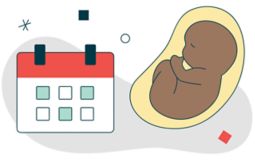
Most babies are born between 37 and 40 weeks.

This is a good time to pack a bag to take with you to the birth. Then it will be ready to go when you are.
7 tips for week 37 of pregnancy
Learn about breastfeeding. For example, find out about ways to hold your baby to make breastfeeding easier. And think about learning how to pump and store milk.
Know that crying is normal. It's common for babies to cry 1 to 3 hours a day. Some cry more, and some cry less.
Learn why babies cry. They may be hungry; have gas; need a diaper change; or feel cold, warm, tired, lonely, or tense. Sometimes they cry for unknown reasons.
Think about what will help you stay calm when your baby cries. Taking slow, deep breaths can help. So can taking a break. It's okay to put your baby somewhere safe (like their crib) and walk away for a few minutes.
Learn about safe sleep for your baby. Always put your baby to sleep on their back. Place them alone in a crib or bassinet with a firm, flat surface. Keep soft items like stuffed animals out of the crib.
Learn what to expect with newborn poop. Your baby will have their own bowel patterns. Some babies have several bowel movements a day. Some have fewer.
Know that breastfed babies will often have loose, yellow bowel movements. Formula-fed babies have more formed stools. If your baby's poop looks like pellets, your baby is constipated.
Follow-up care is a key part of your treatment and safety. Be sure to make and go to all appointments, and contact your doctor if you are having problems. It's also a good idea to know your test results and keep a list of the medicines you take.
When should you call for help?
Call 911 anytime you think you may need emergency care. For example, call if:
- You have severe vaginal bleeding. You have soaked through one or more pads in an hour, and the bleeding is not slowing down.
- You have sudden, severe pain in your belly that does not go away.
- You have chest pain, are short of breath, or cough up blood.
- You passed out (lost consciousness).
- You have a seizure.
- You see or feel the umbilical cord.
- You think you are about to deliver your baby and can't make it safely to the hospital or birthing center.
Call your doctor now or seek immediate medical care if:
- You have vaginal bleeding.
- You have belly pain.
- You have a fever.
- You are dizzy or lightheaded, or you feel like you may faint.
- You have signs of a blood clot in your leg (called a deep vein thrombosis), such as:
- Pain in the calf, back of the knee, thigh, or groin.
- Swelling in your leg or groin.
- A color change on the leg or groin. The skin may be reddish or purplish.
- You have symptoms of preeclampsia, such as:
- Sudden swelling of your face, hands, or feet.
- New vision problems (such as dimness, blurring, or seeing spots).
- A severe headache that will not go away.
- You have a sudden release or slow trickle of fluid from your vagina. This may mean your water has broken.
- You notice that your baby has stopped moving or is moving less than normal.
- You have signs of heart failure, such as:
- New or increased shortness of breath.
- New or worse swelling in your legs, ankles, or feet.
- Sudden weight gain, such as more than 2 to 3 pounds in a day or 5 pounds in a week.
- Feeling so tired or weak that you cannot do your usual activities.
- You have symptoms of a urinary tract infection. These may include:
- Pain or burning when you urinate.
- A frequent need to urinate without being able to pass much urine.
- Pain in your low back (below the rib cage and above the waist).
- Blood in your urine.
- You have signs of active labor. During active labor, contractions:
- Happen more often and at regular intervals (about every 3 to 5 minutes).
- Last longer (about 60 seconds or more).
- Get stronger and are hard to talk through.
Watch closely for changes in your health, and be sure to contact your doctor if:
- You have vaginal discharge that smells bad.
- You feel sad, anxious, or hopeless for more than a few days.
- You have skin changes, such as a rash, itching, or a yellow color to your skin.
- You have other concerns about your pregnancy.
Where can you learn more?
Go to http://www.healthwise.net/patientEd
Enter N257 in the search box to learn more about "Week 37 of Your Pregnancy: Care Instructions".
Current as of: July 15, 2025
Author: Ignite Healthwise, LLC Staff
Clinical Review Board
All Ignite Healthwise, LLC education is reviewed by a team that includes physicians, nurses, advanced practitioners, registered dieticians, and other healthcare professionals.

